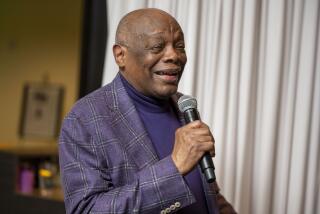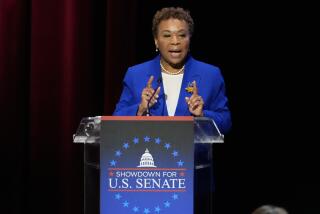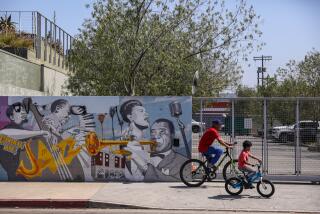Diane Watson’s retirement inspires a look back
In Los Angeles, history often seems to careen on with hardly a backward glance. Last week, as Diane Watson announced that she would retire this year from Congress, history suffused the room and there were backward glances aplenty.
In the conference room off Wilshire Boulevard stood many of the city’s African American political lions, the men and women who helped in 1973 to make Tom Bradley the city’s first -- and so far, only -- African American mayor. Bradley’s name came up early on, as Watson joked to the Rev. Cecil Murray, the former head of First AME Church, about his ability to summon the mayor at all hours.
Others from Bradley’s campaigns also surrounded Watson as she announced, at age 76, that she would not stand for reelection this year, closing out a 35-year political career. They had helped shepherd Watson into office as the first black woman elected to the Los Angeles school board and later to the state Senate.
Watson’s career saw startling change, from a tenure on the school board when integration inspired such anger that she required police protection, to the inauguration of an African American president. And it spanned transitions in Los Angeles as well.
Elected to seats in the state Senate and U.S. Congress seemingly owned by African Americans, she will depart a district whose biggest population is Latino. Demographics have imposed tough new realities on African American politicians here, and the upcoming change underscored them.
Watson was asked bluntly at her announcement: Is this an African American seat? Her diplomatic answer spoke to the nuances involved.
“It should be a seat inherited by someone who can represent everyone in this district,” she said. Later, in an interview, she added: “When I got started it was an issue of black and white. Now it’s black, brown, white and Asian, and everyone is looking for their space and fair treatment.”
To be sure, Watson’s departure from the 33rd Congressional District is not likely to result in the immediate loss of a seat for African Americans. Barring a surprise, the leading candidate for the strongly Democratic seat is Assembly Speaker Karen Bass, who is also African American.
Yet Bass represents a generational, and in some ways cultural, shift from Tom Bradley and Diane Watson’s era.
The Assembly speaker, two decades younger than Watson, is one of a handful of local African American politicians whose success resulted from an alliance with powerful labor forces with a strong Latino orientation.
Bass, originally a community organizer, was pulled into politics at the behest of Miguel Contreras, the late chief of the Los Angeles County Federation of Labor. She benefited hugely from the partnership, much as Mark Ridley-Thomas benefited from his labor connections when he defeated Bernard Parks for a seat on the county Board of Supervisors in 2008.
When Watson was first elected, “labor was not the powerful influence in Los Angeles that it is today,” said Kerman Maddox, a public affairs consultant who worked for Bradley. “If you’re thinking about moving up the ladder now, it makes sense to have strong connections to labor.”
Coalitions are nothing new in Los Angeles, of course: Bradley was elected mayor five times with the backing of African Americans and Jewish and other liberal white voters. But demographic shifts have rendered that formula almost obsolete. Latinos are the fastest-growing segment of the population, and their political influence can be charted by the increased success of Latino politicians.
Fernando Guerra, director of the Center for the Study of Los Angeles at Loyola Marymount University, studied the top 100 elected political positions in Los Angeles County over four decades. Last year, he found, 33% were held by Latinos, 29% by whites, 15% by African Americans and 4% by Asians.
For African Americans, that represented a drop from their high point of almost 19% in 1992, the last full year Tom Bradley served as mayor. White politicians had dropped by 8 percentage points. Latinos, by contrast, had increased their numbers from less than 19% in 1992.
Over the next decade “you just don’t see any growth predicted” for African American positions, Guerra said, because of the declining proportion of African Americans among local voters.
Now, only a dozen African Americans serve California in the Legislature or Congress, compared with almost three dozen Latinos. Until this year, there had rarely been a serious statewide bid by an African American politician since Bradley’s last unsuccessful try for governor in 1986. (Democrat Kamala Harris of San Francisco is currently running for attorney general, and Republican Damon Dunn is vying for secretary of state.)
Looking ahead, African American politicians, like all others in this diverse area, are confronting complicated issues. How do you appeal to your base without offending others? Does President Obama’s election expand the possibilities or diminish the urgency?
“We’re in kind of a transition period,” said Raphael Sonenshein, a Cal State Fullerton professor who has written at length about race and politics in Los Angeles. “First you have to have a base in your own community. . . . But you win with a coalition. I think it takes a great deal of sophistication to lead with your community and go outward.”
Maddox, the Los Angeles consultant, said the successful formula involves “aggressively building coalitions with other voting blocs and running less as quote-unquote African American candidates and more as candidates who can represent everyone but happen to be African American.”
For her part, Watson looked back at a political landscape profoundly different from when she got into the game.
“The world is changing, the country is changing. California changes all the time,” she said. “We’re global. Back then we were parochial.”
cathleen.decker@ latimes.com
Each Sunday, The Week examines implications of major stories. It is archived at latimes.com/theweek.
More to Read
Start your day right
Sign up for Essential California for news, features and recommendations from the L.A. Times and beyond in your inbox six days a week.
You may occasionally receive promotional content from the Los Angeles Times.







